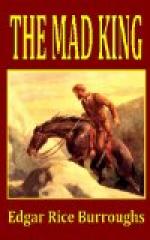New hope burst aflame in the breast of the condemned man. The impostor had not forsaken him. Leopold ran to the window, leaning far out. He heard the voices of the sentries in the barbican as they conversed with the newcomers. Then silence came, broken only by the rapid footsteps of a soldier hastening from the gate to the castle. His hobnail shoes pounding upon the cobbles of the courtyard echoed among the angles of the lofty walls. When he had entered the castle the silence became oppressive. For five minutes there was no sound other than the pawing of the horses outside the barbican and the subdued conversation of their riders.
Presently the soldier emerged from the castle. With him was an officer. The two went to the barbican. Again there was a parley between the horsemen and the guard. Leopold could hear the officer demanding terms. He would lower the drawbridge and admit them upon conditions.
One of these the king overheard—it concerned an assurance of full pardon for Peter of Blentz and the garrison; and again Leopold heard the officer addressing someone as “your majesty.”
Ah, the impostor was there in person. Ach, Gott! How Leopold of Lutha hated him, and yet, in the hands of this American lay not only his throne but his very life as well.
Evidently the negotiations proved unsuccessful for after a time the party wheeled their horses from the gate and rode back toward Blentz. As the sound of the iron-shod hoofs diminished in the distance, with them diminished the hopes of the king.
When they ceased entirely his hopes were at an end, to be supplanted by renewed terror at the turning of the knob of his prison door as it swung open to admit Maenck and a squad of soldiers.
“Come!” ordered the captain. “The king has refused to intercede in your behalf. When he returns with his army he will find your body at the foot of the west wall in the courtyard.”
With an ear-piercing shriek that rang through the grim old castle, Leopold of Lutha flung his arms above his head and lunged forward upon his face. Roughly the soldiers seized the unconscious man and dragged him from the room.
Along the corridor they hauled him and down the winding stairs within the north tower to the narrow slit of a door that opened upon the courtyard. To the foot of the west wall they brought him, tossing him brutally to the stone flagging. Here one of the soldiers brought a flagon of water and dashed it in the face of the king. The cold douche returned Leopold to a consciousness of the nearness of his impending fate.
He saw the little squad of soldiers before him. He saw the cold, gray wall behind, and, above, the cold, gray sky of early dawn. The dismal men leaning upon their shadowy guns seemed unearthly specters in the weird light of the hour that is neither God’s day nor devil’s night. With difficulty two of them dragged Leopold to his feet.




